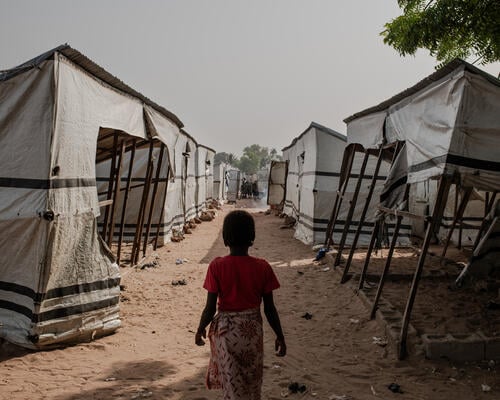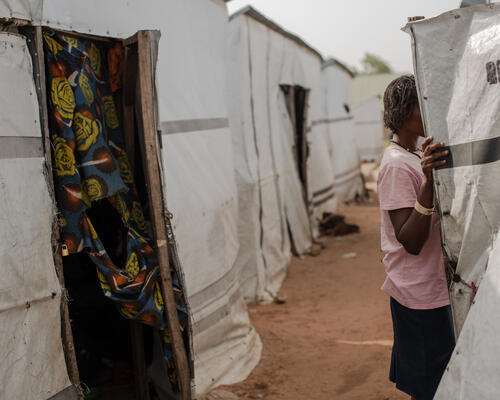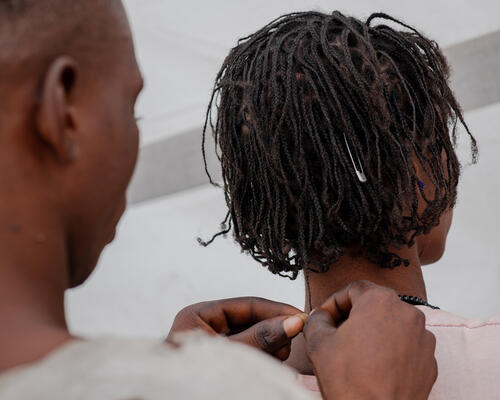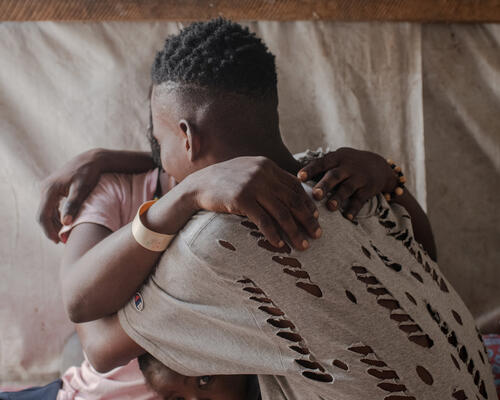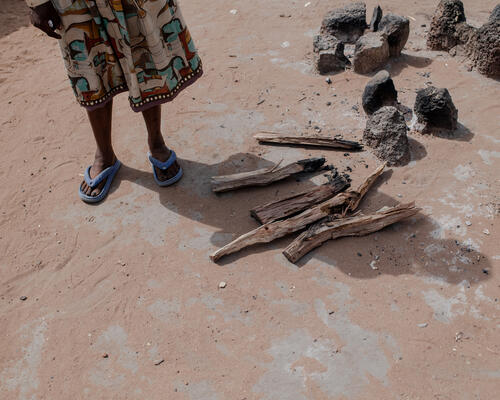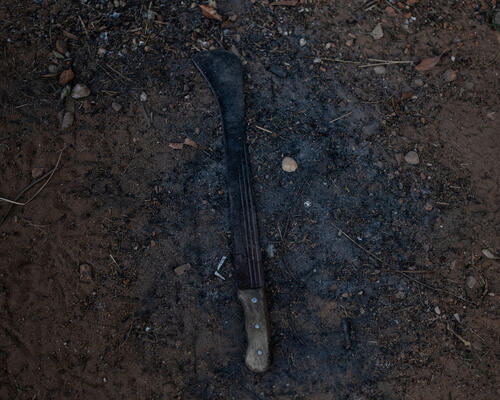Violent clashes in northcentral Nigeria have forced tens of thousands of people from their homes in recent years. Many have settled in camps around Makurdi, the capital of Benue state. Living conditions in the camps are precarious and daily life is a struggle, particularly for women.
After receiving reports of alarming levels of sexual violence against women and girls in the camps, Médecins Sans Frontières (MSF) teams are providing survivors with medical and psychological care. Some survivors have shared their stories.
“He promised me that he would give me money and asked me to meet him at a house outside the camp,” says Iyua*, a mother of six who lives in Mbawa camp, some 20 kilometres north of the state capital Makurdi. Desperate to borrow money to buy food for her children, she had asked the man, who was an acquaintance, for help.
“When I arrived there, he said he would help me only if I had sex with him. I refused, but he physically forced me,” she says. Following the sexual assault, Iyua sought treatment at MSF’s clinic in the camp, which provides care for survivors of sexual violence.
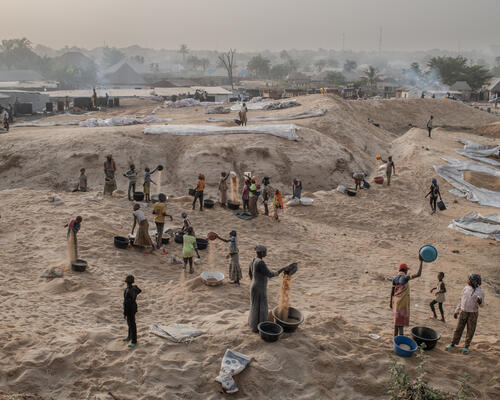
Benue state is an agricultural region in northcentral Nigeria, often known as Nigeria’s food basket, crossed by the country’s second largest waterway, the Benue River. In recent years, insecurity in northern Nigeria has forced many herders to move south into the northcentral region, while climate change and environmental degradation have reduced the availability of fertile land.
The enactment of a law in 2017 prohibiting open grazing led to the exodus of herders from Benue state who could not sustain their traditional way of life, leading to an intensification of armed clashes between herders and farmers. The resulting violence has displaced almost 400,000 people from their homes, according to the International Organization for Migration, with many settling in camps across Benue state.
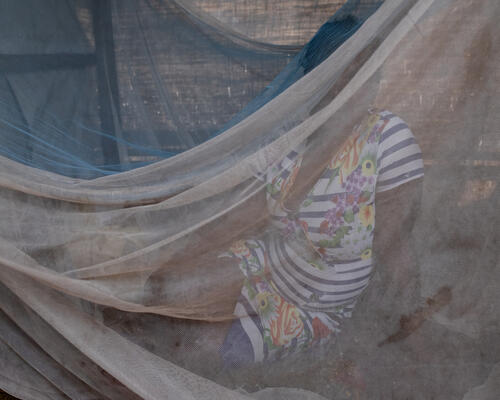
Life in the camps is a struggle. Living conditions are precarious and unsanitary, while there are severe shortages of food, drinking water and basic services, including healthcare. There are also alarming levels of sexual violence, aggravated by impoverishment, power imbalances between women and men, people’s limited means to earn a living, and the wider context of violence.
According to MSF data, the majority of perpetrators of sexual violence are intimate partners of survivors, but sexual violence is also perpetrated by acquaintances and strangers, whether civilians or non-civilians. Often the lone providers for their families, many women have no choice but to leave the camps in search of food and wood for fuel, exposing themselves to the risk of sexual violence.
Dooshima*, a schoolgirl, was working on a farm one day when she was forced by her mother and sister to take a motorbike ride with men she did not know.
“As we were approaching a village, a crowd of people started shouting, singing and cheering,” she says. “I recognised wedding songs.”
At that moment Dooshima realised she had been sold by her family into marriage. Such was her desperation that she remembers wondering if she had anything with her that she could use to kill herself.
My mother did not want to see me ever again. She took all my belongings, including my school uniform and books, and burnt everything.Dooshima*, a schoolgirl who was sold by her family into marriage
After being married to a man 30 years her senior, Dooshima was locked up in a small house. She tried to escape but was recaptured and beaten. After three days of being kept prisoner, her husband came into the house and raped her. Dooshima ran away again and this time evaded capture.
Reaching home, Dooshima found herself rejected by her family. “My mother did not want to see me ever again,” she says. “She took all my belongings, including my school uniform and books, and burnt everything”.
After seeking medical treatment from MSF, Dooshima discovered she was pregnant and decided to have an abortion.
Now Dooshima is selling oranges to make enough money to replace the clothes her mother burned. She plans to learn how to sew so that she can earn enough to buy books and go back to school. More than anything, she wants to continue her education. “I would like to become a doctor and save lives,” she says.
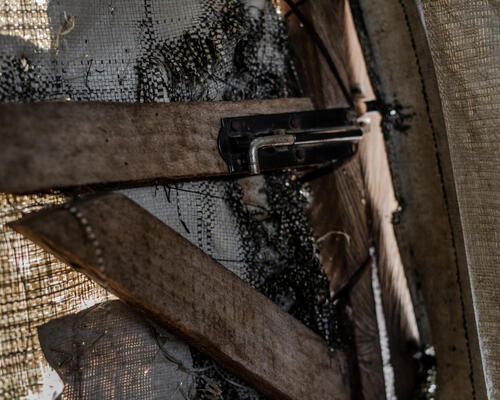
Shiana* moved to Mbawa camp five years ago with her older sister. She gave birth to two babies, but both died in early childhood. Since her own childhood, Shiana has been living with a disability.
“I was asleep when someone knocked on my door at night,” she says. “The man promised to bring me something to eat, then he forced the door of my tent, as the lock was broken, and insisted on having sex with me. I refused and tried to push him away but he squeezed my arms and raped me.”
Shiana was sexually assaulted twice by men who forced their way into her tent taking advantage of her physical disability. “Last night again, a man came and tried to enter, but I woke up quickly enough and blocked the door from the inside; this happens regularly in the camp,” she says.
Shiana has no means of earning money, but sometimes walks to a nearby market to pick up spilt grain from the ground, which she collects and sells.
The key to preventing sexual violence is to address people’s humanitarian needs and ensure that vulnerable people are safe within the camps.Resit Elcin, MSF project coordinator
A few tents away from Shiana lives Seember*. Seember’s husband was a farmer who was killed in a night-time attack. “My husband was captured and shot when he tried to run out of the house,” she says. “He was lying dead on the ground when another man came and cut off his head with a machete.”
Seember and her two children escaped and fled to Mbawa camp. In April 2023, she was working on a farm, harvesting crops with other women, when they were ambushed by five men – three with guns and two with machetes. The men discussed whether to kill them but decided to rape them instead.
“When I saw these men arriving in the field, I felt anger,” she says. “I thought of my husband´s death and thought it was my turn to leave this world, but I refrained from defending myself against the perpetrators so that I could remain alive to take care of my children.”
The rape left Seember unable to walk unaided. A relative brought her to MSF’s clinic in Mbawa camp, where she received medical care and mental health support.
Seember says that she feels very lonely without her husband and that when she sits by herself the disturbing memories come flooding back. Her teenage son Fanan does his best to comfort and distract her by making her laugh or plaiting her hair.
Iyua, Dooshima, Shiana and Seember are just four among thousands of women and girls living in camps in Benue state who have survived sexual violence. Without preventive action, MSF warns that the risks for women will continue to escalate.
“It is important to highlight that the social environment is not getting better,” says Resit Elcin, MSF project coordinator in Nigeria. “There is a lack of livelihood options for displaced people, particularly for women, and protection and prevention efforts are barely in place. The situation is not improving.
“Survivors of sexual violence, both in Benue state and across Nigeria, deserve access to free-of-charge and quality medical care and mental health support,” says Elcin.
“Women and girls need access to services including safe housing and emergency shelter, legal assistance, and livelihood and financial support. The key to preventing sexual violence is to address people’s humanitarian needs and ensure that vulnerable people are safe within the camps,” he says.
“Humanitarian and development organisations, both local and international, must work alongside the Nigerian authorities to ensure that medical and psychological support is freely available to survivors of sexual violence in Benue state and, more broadly, to support displaced communities regain their dignity and control over their lives,” he says.
*Names changed to protect patients’ identities
MSF launched an emergency response to assist displaced people in Benue state in 2018, providing them with medical care, including sexual and reproductive healthcare and comprehensive care for survivors of sexual violence. In 2023, MSF teams in Benue treated more than 1,700 survivors of sexual violence.
Throughout our intervention, MSF has primarily supported displaced farming communities and host communities surrounding the IDP camps. More must be done to understand the humanitarian-health needs of herding communities, and the impact of violence on their lives.




